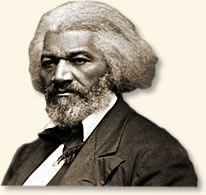Escape from Slavery, 1838
Frederick Douglass lived a remarkable life. Born in 1818 on Maryland's Eastern Shore, his mother was a slave, his father an unknown white man. Eventually he was sent to Baltimore where he worked as a ship's caulker in the thriving seaport. He made his dash to freedom from there in 1838. His ability to eloquently articulate the plight of the slave through his various publications and public speeches brought him international renown. Towards the end of his life, Douglass served his country as Consul General to Haiti and Charge d'Affaires for Santo Domingo. He died in 1895.
Freeman's Papers
 |
| Frederick Douglass |
"It was the custom in the State of Maryland to require the free colored people to have what were called free papers. These instruments they were required to renew very often, and by charging a fee for this writing, considerable sums from time to time were collected by the State. In these papers the name, age, color, height, and form of the freeman were described, together with any scars or other marks upon his person which could assist in his identification. This device in some measure defeated itself-since more than one man could be found to answer the same general description. Hence many slaves could escape by personating the owner of one set of papers; and this was often done as follows: A slave, nearly or sufficiently answering the description set forth in the papers, would borrow or hire them them till by means of them he could escape to a free State, and then, by mail or otherwise, would return them to the owner. The operation was a hazardous one for the lender as well as for the borrower. A failure on the part of the fugitive to send back the papers would imperil his benefactor, and the discovery of the papers in possession of the wrong man would imperil both the fugitive and his friend."


1 comment:
Who have thought we would have the same issue rear its ugly head 180 or so years later! The struggle is never over...until the job of achieving equality is accomplished...
Post a Comment